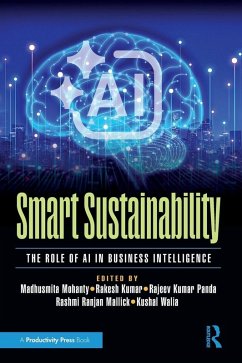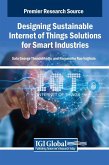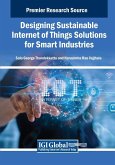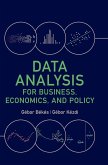Madhusmita Mohanty, Rakesh Kumar, Rajeev Kumar Panda
Smart Sustainability
The Role of AI in Business Intelligence
Madhusmita Mohanty, Rakesh Kumar, Rajeev Kumar Panda
Smart Sustainability
The Role of AI in Business Intelligence
- Gebundenes Buch
- Merkliste
- Auf die Merkliste
- Bewerten Bewerten
- Teilen
- Produkt teilen
- Produkterinnerung
- Produkterinnerung
The book helps investors, entrepreneurs, and legislators make well-informed decisions. It increases public understanding of how augmented reality and virtual reality can support sustainable behaviors.
Andere Kunden interessierten sich auch für
![Designing Sustainable Internet of Things Solutions for Smart Industries Designing Sustainable Internet of Things Solutions for Smart Industries]() Designing Sustainable Internet of Things Solutions for Smart Industries289,99 €
Designing Sustainable Internet of Things Solutions for Smart Industries289,99 €![Designing Sustainable Internet of Things Solutions for Smart Industries Designing Sustainable Internet of Things Solutions for Smart Industries]() Designing Sustainable Internet of Things Solutions for Smart Industries220,99 €
Designing Sustainable Internet of Things Solutions for Smart Industries220,99 €![The Handbook of Ethical Purchasing The Handbook of Ethical Purchasing]() Rob HarrisonThe Handbook of Ethical Purchasing168,99 €
Rob HarrisonThe Handbook of Ethical Purchasing168,99 €![Buddhist and Taoist Systems Thinking Buddhist and Taoist Systems Thinking]() Josep M. CollBuddhist and Taoist Systems Thinking168,99 €
Josep M. CollBuddhist and Taoist Systems Thinking168,99 €![The Complete Company Policies The Complete Company Policies]() Ian LongThe Complete Company Policies171,99 €
Ian LongThe Complete Company Policies171,99 €![Knowledge Management Knowledge Management]() Irma Becerra-FernandezKnowledge Management207,99 €
Irma Becerra-FernandezKnowledge Management207,99 €![Data Analysis for Business, Economics, and Policy Data Analysis for Business, Economics, and Policy]() Gábor BékésData Analysis for Business, Economics, and Policy207,99 €
Gábor BékésData Analysis for Business, Economics, and Policy207,99 €-
-
-
The book helps investors, entrepreneurs, and legislators make well-informed decisions. It increases public understanding of how augmented reality and virtual reality can support sustainable behaviors.
Produktdetails
- Produktdetails
- Verlag: Productivity Press
- Seitenzahl: 486
- Erscheinungstermin: 5. September 2025
- Englisch
- Abmessung: 260mm x 183mm x 31mm
- Gewicht: 1101g
- ISBN-13: 9781041013051
- ISBN-10: 1041013051
- Artikelnr.: 73532191
- Herstellerkennzeichnung
- Libri GmbH
- Europaallee 1
- 36244 Bad Hersfeld
- gpsr@libri.de
- Verlag: Productivity Press
- Seitenzahl: 486
- Erscheinungstermin: 5. September 2025
- Englisch
- Abmessung: 260mm x 183mm x 31mm
- Gewicht: 1101g
- ISBN-13: 9781041013051
- ISBN-10: 1041013051
- Artikelnr.: 73532191
- Herstellerkennzeichnung
- Libri GmbH
- Europaallee 1
- 36244 Bad Hersfeld
- gpsr@libri.de
Madhusmita Mohanty is currently working as an Assistant Professor Senior Grade (Finance and Analytics) at VIT-AP School of Management (VSB), VIT-AP University. She earned her doctoral degree from the National Institute of Technology, Rourkela, Odisha, India. Her areas of expertise include financial management, security analysis and portfolio management, project analysis and control systems, financial and financial modeling, and financial market with relation to AI, ML, and blockchain applications. She has 12 years of experience in teaching and research. She received a Gold Medal "AIMS J L Batra Best Research Paper Award" for the paper titled "An Empirical Analysis of Volatility Spill-Over Effect on Indian Financial Market Efficiency: U.S. Fed Policy or International Capital Flows" during the 32nd AIMS Annual Management Education Convention from 26 August to 28 August 2021. She has presented papers at various reputed national and international conferences. She is proficient in STATA, E-Views, and data analytics using Advanced Excel, R Statistics, and Python. She is optimistic about delivering the best of theoretical and technical knowledge with practical applicability in the recent world. Rakesh Kumar is an eminent educationist and decorated army officer with 25 years of experience. He is a classic example of courage, commitment, and intimate relationships. His areas of expertise are finance, business law, economics, labor law, technology, and sustainability. He has expertise in structural equation modeling (SEM), ISM, and Fuzzy TOPSIS research methodology. He is an interdisciplinary researcher. He is also involved in course and syllabus designing and development on various management topics, including analytics and management curriculum. He is the editor of reputed publications. He has been part of the board of study, board of examination, and evaluation department in government organizations. He has been part of many international conferences. He also acts to lead and liaise between the student community and industry delegates, with a keen interest in training around emotions and spirituality. Currently, he is working as Assistant Professor at the Department of Management Studies, Graphic Era Deemed to be University. Rajeev Kumar Panda is presently working as Professor at the School of Management, National Institute of Technology Rourkela, India. His areas of interest include Entrepreneurship & Start-up Ecosystem, Skill Development, Service Quality Modeling, and Strategic Branding. He is the recipient of the prestigious Academy of Marketing Science (AMS) Young Researcher Award at the Annual Conference 2015 in New Orleans, USA. He has been awarded the Best Research Paper in many International Conferences of repute, such as the IIM Indore-NASMEI Summer Marketing Conference 2017 and the International Conference on Business Analytics and Intelligence (ICBAI, 2018) at IISC Bangalore, to name a few. He has published more than 50 research papers in top-rated international journals. He has presented papers at various reputed conferences, including the American Marketing Association (AMA) Annual Conference at UC San Diego (2020), the International Conference (2018) at the University of Cambridge, UK, and the Strategic Management Forum Conference at Rome (2015). He has been involved in the training and development of managers of many public and private sector organizations. Dr. Panda is the Founder Director of NIT Rourkela's Incubation Centre, FTBI. He was invited by the Office of the President of India to the Festival of Innovations, 2016 and 2017, at Rashtrapati Bhavan, New Delhi, to showcase institutional innovations and their outcomes. Rashmi Ranjan Mallick, Director, KPMG Middle East, Cities, Infrastructure, PPP, Riyadh, Saudi Arabia, has 16 years of management consulting experience in developing business and leading several large-scale infrastructure, PPP, cities, and real estate projects from structuring to financial close to delivery across the Middle East, Philippines, and India. He brings a unique profile with a background in management, planning (Masters), and economics (Masters). He has a track record of developing and leading multicultural teams to drive business growth. He has successfully closed billion-dollar infrastructure project deals. He played a key role in the structuring of high-quality winning proposals to secure advisory projects worth over $50 million to developing lasting relationships with clients. He successfully developed the New Cities Advisory Practice within the Infrastructure Group at KPMG Saudi to expand the group's service offerings. Currently, for Cities Advisory, he is expanding the business, expanding the multicultural team, and leading the delivery of large-scale projects. Earlier, he led the delivery of large-scale infrastructure, real estate, and PPP projects in the Kingdom. Kushal Walia is the Senior Product Manager Technical at Amazon Web Services, with extensive experience in artificial intelligence, cloud computing, serverless computing, and distributed computing. He has developed deep expertise in enhancing the developer experience for AWS services, focusing on security, governance, and fraud containment on serverless platforms. Kushal's technical leadership at AWS extends to building supply chain, logistics, and people analytics solutions, including cloud computing, serverless computing, and AI. Kushal has led initiatives to improve the efficiency of AWS's supply chain and logistics systems. These systems, which directly relate to the compute asset infrastructure that AWS manages, have had a significant impact on key government contracts, including those with the US Department of Defense. His work on streamlining operations and optimizing infrastructure usage has directly contributed to the success of these contracts. Kushal's work on AI and machine learning in real-world problems extends to improving the employee experience at AWS. By leveraging large-scale data and people analytics, Kushal has driven meaningful changes in our global workforce's engagement and satisfaction. These insights have not only enhanced the employee experience but have also contributed to the overall productivity and success of the organization. Kushal's origin in computer science has foundations in software engineering and big data engineering. As Software Development Engineer, Kushal built solutions that enabled large U.S. companies to comply with Payment Card Industry Data Security Standards (PCI DSS) while accepting payments in a secure and compliant manner. Additionally, as Big Data Engineer, Kushal worked with e-commerce companies to optimize their marketing spend, increase conversion rates, and drive customer acquisition and growth.
Chapter 1. Developing Sustainable Business Intelligence through Artificial
Intelligence Chapter 2. Evolution Of Sustainable Intelligence Business
Practices Chapter 3. AI-Driven Disruption: Driving Business Innovation and
Excellence Chapter 4. Green Supply Chain Management with AI Chapter 5. Firm
Performance, Innovation, and Government Support in Agriculture SMEs
Chapter 6: An Empirical Study on Role of Green Banking and Technology in
Sustainable Development Chapter 7: Driving Circular Economy Success: The
Power of Collaborative Platforms Chapter 8: Harnessing Artificial
Intelligence in Business Intelligence Systems: Advancing Smart
Sustainability in Management Chapter 9: AI and Sustainability Corporate
Governance Reporting Chapter 10: Carbon Taxation and Sustainable Business
Practices: A Blueprint for India's Green Economy Chapter 11. A Study on
Perception of Gen Z Customers on Artificial Intelligence in Chennai City
Chapter 12: The Intersection of AI and Financial Sustainability: Evaluating
the Influence of AI-Based Decision-Making, Risk Assessment, and
Transparency in Banking: Special Reference to Private Banks in Tamil Nadu
Chapter 13 :AI-Driven Sustainable Logistics and Inventory Management:
Bridging Efficiency and Environmental Responsibility Chapter 14.
Artificial Intelligence for Sustainable Business Development Chapter 15.
Integrating SDGs intoo Industry 4.0's Sustainable Business Practices:
Efficiency and Challanges Chapter 16. Career Exploration and Sustainable
Innovation in Tech SMEs: Advancing Employability Readiness and Business
Sustainability Chapter 17. A Bibliographical Analysis of Corporate Social
Responsibility and Climate Change through R Studio Chapter 18 :A Study on
Behavioural Intention and Actual Usage of Artificial Intelligence among the
Select Service Sector Employees Chapter 19. Geo-Based Causal Analysis and
Risk Evaluation of BOPIS Fee Elimination in Retail Store Rollouts
Intelligence Chapter 2. Evolution Of Sustainable Intelligence Business
Practices Chapter 3. AI-Driven Disruption: Driving Business Innovation and
Excellence Chapter 4. Green Supply Chain Management with AI Chapter 5. Firm
Performance, Innovation, and Government Support in Agriculture SMEs
Chapter 6: An Empirical Study on Role of Green Banking and Technology in
Sustainable Development Chapter 7: Driving Circular Economy Success: The
Power of Collaborative Platforms Chapter 8: Harnessing Artificial
Intelligence in Business Intelligence Systems: Advancing Smart
Sustainability in Management Chapter 9: AI and Sustainability Corporate
Governance Reporting Chapter 10: Carbon Taxation and Sustainable Business
Practices: A Blueprint for India's Green Economy Chapter 11. A Study on
Perception of Gen Z Customers on Artificial Intelligence in Chennai City
Chapter 12: The Intersection of AI and Financial Sustainability: Evaluating
the Influence of AI-Based Decision-Making, Risk Assessment, and
Transparency in Banking: Special Reference to Private Banks in Tamil Nadu
Chapter 13 :AI-Driven Sustainable Logistics and Inventory Management:
Bridging Efficiency and Environmental Responsibility Chapter 14.
Artificial Intelligence for Sustainable Business Development Chapter 15.
Integrating SDGs intoo Industry 4.0's Sustainable Business Practices:
Efficiency and Challanges Chapter 16. Career Exploration and Sustainable
Innovation in Tech SMEs: Advancing Employability Readiness and Business
Sustainability Chapter 17. A Bibliographical Analysis of Corporate Social
Responsibility and Climate Change through R Studio Chapter 18 :A Study on
Behavioural Intention and Actual Usage of Artificial Intelligence among the
Select Service Sector Employees Chapter 19. Geo-Based Causal Analysis and
Risk Evaluation of BOPIS Fee Elimination in Retail Store Rollouts
Chapter 1. Developing Sustainable Business Intelligence through Artificial
Intelligence Chapter 2. Evolution Of Sustainable Intelligence Business
Practices Chapter 3. AI-Driven Disruption: Driving Business Innovation and
Excellence Chapter 4. Green Supply Chain Management with AI Chapter 5. Firm
Performance, Innovation, and Government Support in Agriculture SMEs
Chapter 6: An Empirical Study on Role of Green Banking and Technology in
Sustainable Development Chapter 7: Driving Circular Economy Success: The
Power of Collaborative Platforms Chapter 8: Harnessing Artificial
Intelligence in Business Intelligence Systems: Advancing Smart
Sustainability in Management Chapter 9: AI and Sustainability Corporate
Governance Reporting Chapter 10: Carbon Taxation and Sustainable Business
Practices: A Blueprint for India's Green Economy Chapter 11. A Study on
Perception of Gen Z Customers on Artificial Intelligence in Chennai City
Chapter 12: The Intersection of AI and Financial Sustainability: Evaluating
the Influence of AI-Based Decision-Making, Risk Assessment, and
Transparency in Banking: Special Reference to Private Banks in Tamil Nadu
Chapter 13 :AI-Driven Sustainable Logistics and Inventory Management:
Bridging Efficiency and Environmental Responsibility Chapter 14.
Artificial Intelligence for Sustainable Business Development Chapter 15.
Integrating SDGs intoo Industry 4.0's Sustainable Business Practices:
Efficiency and Challanges Chapter 16. Career Exploration and Sustainable
Innovation in Tech SMEs: Advancing Employability Readiness and Business
Sustainability Chapter 17. A Bibliographical Analysis of Corporate Social
Responsibility and Climate Change through R Studio Chapter 18 :A Study on
Behavioural Intention and Actual Usage of Artificial Intelligence among the
Select Service Sector Employees Chapter 19. Geo-Based Causal Analysis and
Risk Evaluation of BOPIS Fee Elimination in Retail Store Rollouts
Intelligence Chapter 2. Evolution Of Sustainable Intelligence Business
Practices Chapter 3. AI-Driven Disruption: Driving Business Innovation and
Excellence Chapter 4. Green Supply Chain Management with AI Chapter 5. Firm
Performance, Innovation, and Government Support in Agriculture SMEs
Chapter 6: An Empirical Study on Role of Green Banking and Technology in
Sustainable Development Chapter 7: Driving Circular Economy Success: The
Power of Collaborative Platforms Chapter 8: Harnessing Artificial
Intelligence in Business Intelligence Systems: Advancing Smart
Sustainability in Management Chapter 9: AI and Sustainability Corporate
Governance Reporting Chapter 10: Carbon Taxation and Sustainable Business
Practices: A Blueprint for India's Green Economy Chapter 11. A Study on
Perception of Gen Z Customers on Artificial Intelligence in Chennai City
Chapter 12: The Intersection of AI and Financial Sustainability: Evaluating
the Influence of AI-Based Decision-Making, Risk Assessment, and
Transparency in Banking: Special Reference to Private Banks in Tamil Nadu
Chapter 13 :AI-Driven Sustainable Logistics and Inventory Management:
Bridging Efficiency and Environmental Responsibility Chapter 14.
Artificial Intelligence for Sustainable Business Development Chapter 15.
Integrating SDGs intoo Industry 4.0's Sustainable Business Practices:
Efficiency and Challanges Chapter 16. Career Exploration and Sustainable
Innovation in Tech SMEs: Advancing Employability Readiness and Business
Sustainability Chapter 17. A Bibliographical Analysis of Corporate Social
Responsibility and Climate Change through R Studio Chapter 18 :A Study on
Behavioural Intention and Actual Usage of Artificial Intelligence among the
Select Service Sector Employees Chapter 19. Geo-Based Causal Analysis and
Risk Evaluation of BOPIS Fee Elimination in Retail Store Rollouts








